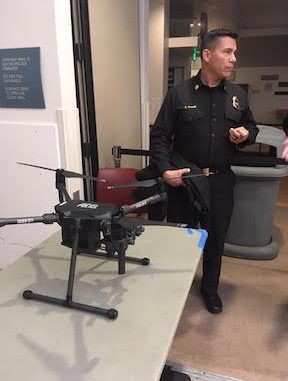
“It’s a matter of using technology to prevent injury or loss of life,” said Culver City Police Captain Jason Sims. ” We are not interested in abusing the public trust.”
A small crowd of community members turned out on a rainy Tuesday evening to connect with the Culver City Police Department about the soon-to-debut drone program, which will give CCPD and CCFD the use of unmanned aerial vehicles to assist with specific situations. The meeting, on January 15, 2019 began at 6:30 pm, and gave Captain Jason Sims a chance to give a brief but thorough perspective on drone use. The presentation ended with a long questions and answer session, with the community addressing a variety of concerns.
Citing a number of incidents in the history of Culver City where use of a drone might have made a positive difference, Sims began with a home invasion robbery in 1994 where an officer was shot and concluded with the barricade situation at the Ramada Inn earlier this month. No one was injured at the Ramada Inn, but Sims noted this was exactly the kind of incident where being able to send a drone to get information would have been a much safer way to interact when the suspect was firing at the responding officers.
Other local municipalities that have already begun using drones – Torrance, Redondo Beach, Santa Monica and others – were cited as evidence that drones will help police and fire to assess risk without putting their people in danger.
Sims took great care to emphasize the respect for the sanctuary city declaration, and the state of California code SB 54 in respect to privacy of immigration status. “We are not helping ICE, and we do not investigate immigration status. These UAVs are only to be used in specific situations as outlined in the policy.”
The questions and statements from the attendees at the meeting ran the spectrum from questioning the storage of the information collected by the drones to offering practical experience of drone use in other law enforcement situations.
Rick Tuttle noted that “freedom and privacy are the major issues here; why can’ t we let this play out for a while longer and see what happens with other cities using drones? ”
More than one person asked about storage of the video taken by the machines, and the length of time it would be held – two years- was seen as both too long and not long enough. Sims emphasized that there was no sound on the video, and that only one of the styles of drones purchased by the department has heat-vision for use in the dark.
The pilot program is planned to launch later this month or early in February.
Judith Martin-Straw


Be the first to comment